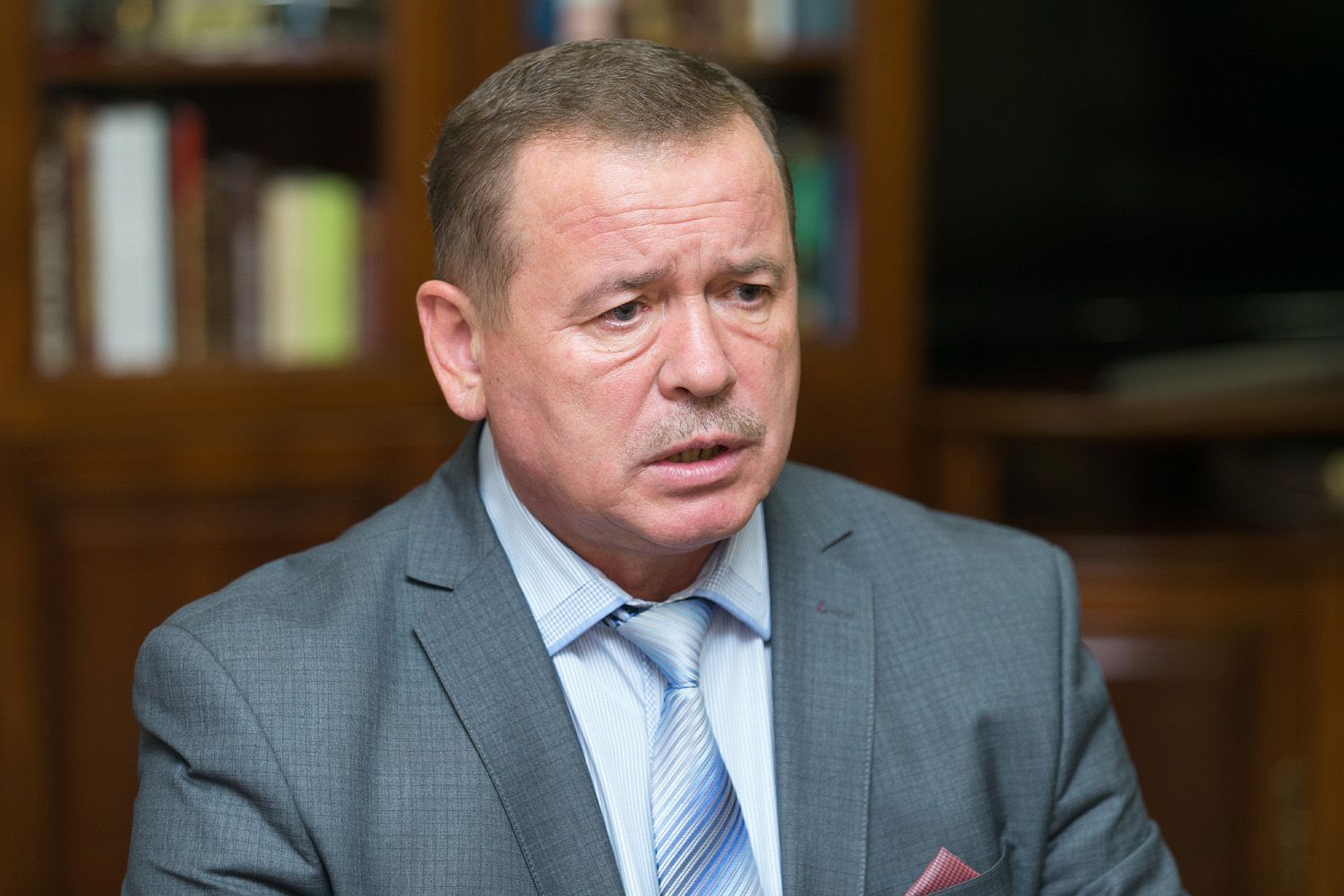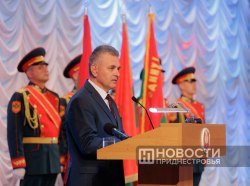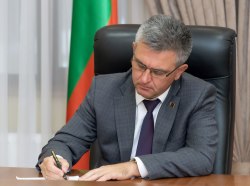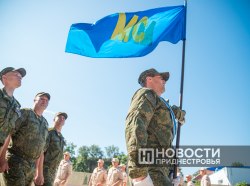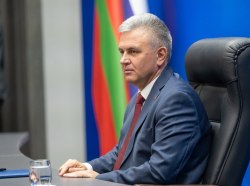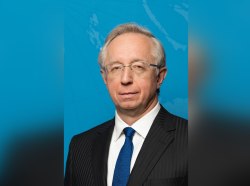Tiraspol, December 28. /Novosti Pridnestrovya/. The Сo-chairman of JCC from Pridnestrovie Oleg Belyakov commented on the results of the outgoing year in an interview with Novosti Pridnestrovya news agency
– The year of 2020 is nearly over. It seemed quite difficult for Pridnestrovie, as well as for the whole world. What was this year for the peacekeeping operation?
– In a lot of ways, 2020 was not only a difficult year, but also a truly overwhelming for Pridnestrovie. This is in reference to foreign policy aspects, that is fraught with threats and strong challenges to the republic. At the same time, it will be fair to say, that 2020 has become a special year for the peacekeeping operation on the Dniester. Today the situation is developing in such a way, that events within the framework of the peacekeeping operation in the current format, which is to say under the guarantee of the Russian Federation, are of great importance not only for our state, but also for the general policy environment in the entire north-western Black Sea region. The year of 2020 for the peacekeeping operation in Pridnestrovie became another year (the 29th in succession) of hard and relentless work for preserving peace in the region.
– The pandemic has made its own adjustments in the peacekeeping units’ work. How have the peacekeepers’ service conditions changed and have you managed to prevent coronavirus’s outbreaks in military communities?
– The coronavirus pandemic directly affected all current processes in Pridnestrovie, including the peacekeeping one. The Joint Control Commission, the Joint Military Command of the Joint Peacekeeping Forces are undertaking every possible effort to prevent any outbreak of coronavirus infection among peacekeepers. A corresponding plan has been developed, which is strictly followed by all the military contingents of the Joint Peacekeeping Forces (JPF). The result of such work is obvious: serious outbreaks of COVID-19 among service members of peacekeeping subdivisions in 2020 were avoided. The peacekeeping activities prescribed by the 1992 Agreement haven’t been weakened for a minute.
– Since this spring, there has been a certain crisis in the Joint Control Commission’s work. What has caused the blocking of the JCC meetings? What problems and disagreements are preventing the parties from moving forward in the work of the peacekeeping operation’s governing body?
– It needs to be recognized, that difficulties in conducting a peacekeeping operation in the existing format persist and, moreover, in the year of in 2020 they have a tendency of permanent growth. The coronavirus pandemic is an undeniable complicating factor in this process. Nevertheless, for the Moldovan side, it’s only a backdrop and a tool for generating crisis phenomena during the peacekeeping operation. The main aim is the operation’s reformatting generally with a weakening of the Russian Federation role or restructuring the functioning of peacekeeping institutions by expanding the powers of OSCE representatives in its activities. All this became the main reason for the blocking of the JCC meetings by the Moldovan side through artificial reasons. This is all done either by refusing to approach at the JCC meetings any issues besides those proposed by the Moldovan delegation, these is ignoring the JCC Rules, or by refusing to sign the JMC reports on the situation in the Security Zone. As well as the Moldovan officers, who are obliged to participate in the control activities of the JMC in the Security Zone, they also not unfrequently refuse to sign the military observers’ acts, despite the fact that this’s their direct duty. Such a disturbance of the peacekeeping operation’s basic regulatory guides is absolutely unacceptable, but it’s obviously, that this position is quite acceptable for the Moldovan side. The aim is to discredit the current peacekeeping operation and achieve its reformatting. There is a corresponding pretext for such activity – the presence of Pridnestrovian sanitary and quarantine posts in the Security Zone. It’s known, that the JCC is not competent to put out or remove military and security services’ posts of the parties in the Security Zone. The Moldovan side has an entire system of such posts in the territories accountable to it. In a pandemic, the Pridnestrovian quarantine posts perform sanitary and quarantine functions. This is their official mission. The Moldovan side is taking practical actions that adversely impact the Pridnestrovian residents living in the Security Zone. For example, Moldovan security forces have delayed truck transport with delivering goods to combat the pandemic to Pridnestrovie. The blocking of VISA and MasterCard charge cards, which are used to transfer salaries and pensions for tens of thousands of Pridnestrovians, also looks completely unsightly. Thus, it’s not the sanitary and quarantine posts, that leave the Pridnestrovian residents without pharmaceuticals, medical facilities, food products and livelihoods under the COVID-19 threat, but the Moldovan side with its real blockade actions.
– Did the electoral processes in the Republic of Moldova influence the implementation of the peacekeeping operation? On your mind, it was possible to avoid provocations, that took place in the Security Zone on November 1 and 15?
– Even in the conditions of an unprecedented escalation during the voting period at the presidential elections in the Republic of Moldova, the situation in the Security Zone remained generally manageable and controlled. Russian, Moldovan and Pridnestrovian peacekeepers contributed to the settlement of all alarm conditions near the Joint Peacekeeping Forces (JPF) posts, kept the peace and prevented these situations from turning into a dangerous confrontation. Actually, the conditions were really alarming. It should be reminded how the so-called combatants of Moldova behaved the day before the voting. What attitude did they show to the Pridnestrovians, whose heads they promised to bring to the Moldovan parliament. On November 1 and 15 the paramilitary units of these people blocked the roads leading from Pridnestrovie to the settlements, where polling places were deployed. The combatants obstructed the passage of Pridnestrovians with Moldovan citizenship to the voting places, threatened them, took video and photographs of people and their vehicles.
– The President-elect of the RM, Maia Sandu, has frequently declared the necessity of withdrawing the Russian military from Pridnestrovie and reformatting the peacekeeping mission itself. How do you assess such statements and how justifiably is it today to change peacekeepers to civilian observers?
– All the years of the peacekeeping operation in Pridnestrovie have shown, that there is no alternative to the existing peacekeeping format. In 1992, a different format of peacekeeping was already operating in Bendery – a certain international observers’ mission. There is only one question: where did this mission disappear by 4:00 pm on June 19, 1992, when mines and missiles began to land on the town’s streets, bullets whistled, and civilians perished? And this despite the fact, that the international community knew, that the Pridnestrovians believed in the ceasefire announced by the Moldovan side and fulfilled the requirements to unblock the entrances to the town and withdraw their armed formations from it with control transfer of the situation to this mission. Pridnestrovie will not agree to change the peacekeepers of the current format, which has been keeping peace in the region for more than 28 years, for a new “double mission.”
– This year there was an armed conflict in Nagorno-Karabakh, which was extinguished with the Russian Federation mediating role. Now the peace in the Caucasus, as well as in Pridnestrovie, is guarded by Russian peacekeepers. In your opinion, will the peacekeeping operation in the Nagorno-Karabakh Republic (NKR) be as successful as on the Dniester?
– The armed conflict in Nagorno-Karabakh is in fact somewhat similar to the one, that took place in 1992 in Pridnestrovie. Time will show whether the Nagorno-Karabakh conflict will finally complete after the Russian peacekeepers military intervention. But today one thing is clear: the peacekeeping operation in the NKR is undoubtedly successful because the bloodshed has been stopped, people are not perishing. This is the main indicator for any operation of this kind. And how successful our peacekeeping operation is under the warrantees of the Russian Federation can be judged by comparing it with international peacekeeping missions in Africa, Asia and the Middle East. The bloodshed there hasn’t been stopped yet.
– In conclusion, what would you wish next year to the peacekeepers, who have been keeping peace on the Pridnestrovian land for 28 years?
– First of all, strength of mind, devotion to duty, respect for people. Also I would wish health to every peacemaker, his family and relatives, success in duty service, in private life, peace and prosperity.

